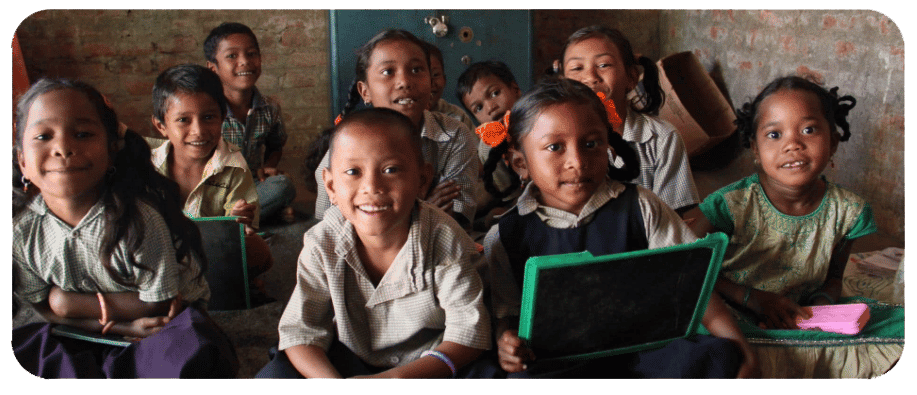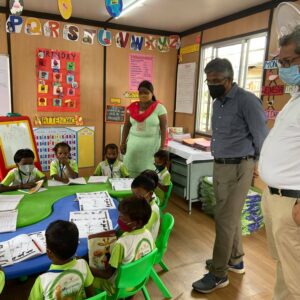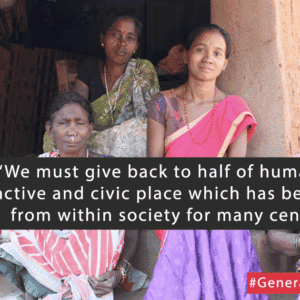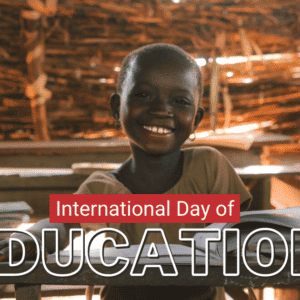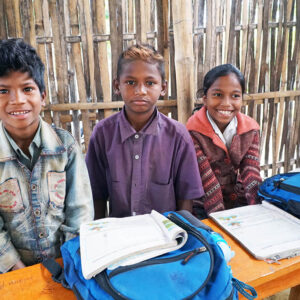Chennai, 4th October 2021: The recent health, political or natural crises have highlighted the essential role of teachers, these everyday heroes on whose shoulders rest nothing less than the future of the children and citizens of tomorrow. Celebrating them once a year, on October 5, the date of World Teachers’ Day, is certainly essential but insufficient in view of the conditions and the risks in which they work. Aide et Action calls for the teaching profession, often relegated to the background, to finally be honored after the intense sacrifice of the past two years.
Since its adoption in 1994 by the United Nations,World Teachers’ Day has made it possible each year to highlight and honor the profession of teachers, to take stock of the progress made and the many challenges they face. Each year, it is common to recall the extraordinary work carried out by these everyday heroes, whose mission, ever more complex, consists in bringing young sailors or shipwrecked people to safe harbor and to train the generations of tomorrow, not only by giving them the bases of education but also that of morality, world citizenship and solidarity. Their role is all the more impressive in times of crisis: beyond guaranteeing essential learning, they above all facilitate the return to normal life, offer essential pyscho-social support, allow the trauma to be forgotten and provide an opportunity to rebuild through knowledge.
Everyday heroes
During COVID-19, teachers around the world have demonstrated their creativity, energy and leadership to achieve, and despite everything, educating our children. They delivered their lessons via new technologies, via radio or television, they created support groups on whatsapp, they redesigned the content, found new ways to communicate with their students, to interest them despite the distance and to follow them one by one. In many low-income countries, where access to the Internet and telephone networks was limited or non-existent (globally, around 50% and 43% of households, respectively, do not own a computer and do not have access to the Internet), the teachers prepared homework for their students, they carried out lessons in small groups, especially for the most marginalized populations. They went door to door, distributed school meals, visited families to encourage them in this difficult time to prioritize the education of their children. They didn’t count their hours, nor their efforts. They continued, at all costs, to provide education for their students. But at what cost ?
An unparalleled crisis
The successive crises have especially exacerbated the extremely difficult conditions in which they already carried out their jobs. The COVID-19 crisis was particularly revealing from this point of view and added a considerable workload on the shoulders of teachers: some lost all salaries during the closure of schools, others bought their own materials, they themselves had to invent the courses for lack of suitable educational resources, they had to innovate and create new means of communicating in a most often absolute solitude without training or support. These difficulties have been added to an already difficult condition: a very low salary, a lack of adequate training, a teacher-student ratio that is too high. “The real question is what do we do with education? Teachers lack resources and support, especially psychological. We are alone in front of our classes. Parents see us as a commercial product and when their children are in difficulty, they call the after-sales service so that the directors question their recruitment, ”explains a French teacher to the French newspaper Liberation on September 14. Many teachers today feel lonely, looked down upon by parents and their superiors. According to a survey carried out jointly by UNESCO, UNICEF and the World Bank on responses to COVID-19 , only half of the countries covered by the survey have offered their teachers additional training on teaching remotely, and less than a third offered them psychosocial support to help them cope with this crisis. The pandemic has taken a fatal blow to the morale, motivation and livelihoods of teachers. No wonder, then, that these difficult conditions further increased the distress of many already exhausted professors and led to a high number of resignations. It is now estimated that, globally, 69 million teachers would be needed to achieve universal primary education by 2030, in line with the United Nations Sustainable Development Goals (over 24 million for primary education) and 44 million for secondary), i.e. a number close to the entire teaching force of primary and secondary cycles in 2019. Yet today clearly few countries escape a severe shortage of teachers. The job is no longer dreaming and has been for a long time.
Teachers on the front line
It does so even less since the various crises have shown above all that, beyond the difficult conditions, teachers are now on the front line, on the front lines of all wars, victims of attacks, exposed to the worst dangers and scourges, at the risk of their health and their lives. The cowardly murdered History-Geography professor Samuel Paty last November will forever remain one of the too many faces of these martyred teachers, who have become the targets of fanatics for their knowledge and the freedom to think they represent. The teaching profession is no longer trivial, it is today a risky profession, an essential key for the future of our children, for the world of tomorrow, for tolerance and peace. Failure to give teachers the recognition and respect they deserve is therefore intolerable, unacceptable, especially in view of the sacrifices of the past years and the threats to come.
It’s not just about “doubling” their wages. It is also imperative to improve their working conditions with quality initial and continuing training, to provide them with help, support and means, to provide suitable educational resources, to develop their leadership skills to promote quality and inclusive education. at all levels. Only teachers will manage to hold the bar in the face of the many and multiple crises which will unfortunately not fail to disrupt our daily life and that of our children. Strengthening their resilience, their capacities for adaptation, leadership, invention and creation is therefore not a gift that we give them but an opportunity that we cannot do without today. The future of our world depends on it.


